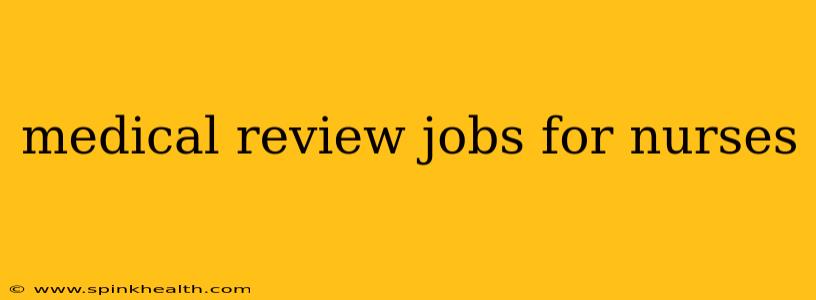A Nurse's Journey into Medical Review: More Than Just Chart Reading
The crisp scent of antiseptic, the hurried rhythm of a busy hospital ward – these are images often associated with nursing. But for many registered nurses (RNs), the path diverges beyond the bedside, leading to a rewarding and intellectually stimulating career in medical review. This isn't just about reviewing charts; it's about using your nursing expertise to ensure quality patient care, impacting healthcare systems on a larger scale. Let's explore the world of medical review jobs for nurses.
My journey into medical review began unexpectedly. After years on a busy oncology floor, the relentless pace started to take its toll. I craved a change, something that utilized my skills but offered a different kind of challenge. The shift to medical review wasn't immediately obvious, but as I researched options, the potential became clearer. My clinical experience, attention to detail, and understanding of medical terminology became significant advantages.
What exactly is medical review?
Medical review, in its simplest form, involves critically analyzing patient medical records to assess the appropriateness, medical necessity, and quality of care provided. Nurses are uniquely positioned for these roles because of their deep understanding of the patient experience, clinical pathways, and the intricacies of medical documentation.
What types of medical review jobs are available for nurses?
The field offers a surprising diversity. Here are some examples:
-
Utilization Review: This focuses on ensuring that healthcare services are medically necessary and provided efficiently. Nurses in this role often review patient charts to determine the appropriate level of care, length of stay, and the necessity of specific procedures or treatments.
-
Case Management: This involves coordinating patient care across multiple settings. Nurses might facilitate transitions from hospital to home, manage complex cases, and advocate for patients' needs while ensuring the cost-effectiveness of care.
-
Quality Improvement: Here, nurses use their clinical expertise to identify areas for improvement in healthcare processes and patient outcomes. This might involve analyzing data, contributing to the development of new protocols, and ensuring compliance with regulatory standards.
-
Medical Record Review for Insurance Companies: Insurance companies frequently employ nurses to review medical records to assess the justification for claims and ensure that billing is accurate and compliant with policy guidelines.
What skills do I need for a medical review job?
Beyond your RN license, several key skills will help you succeed:
-
Critical thinking and analytical skills: You'll need to sift through complex medical information and make informed judgments about the quality of care.
-
Strong attention to detail: Overlooking a crucial detail in a medical record can have significant consequences.
-
Excellent communication skills: You'll be interacting with physicians, other healthcare professionals, and sometimes patients, so clear and effective communication is paramount.
-
Knowledge of medical terminology and coding: A thorough understanding of medical terminology, including ICD and CPT codes, is crucial.
-
Proficiency with electronic health records (EHRs): Most medical review jobs involve working with EHRs, so familiarity with these systems is essential.
How do I find medical review jobs?
Job boards, healthcare staffing agencies, and direct applications to insurance companies and healthcare organizations are all excellent avenues for finding medical review positions. Networking within your professional circle can also open doors to opportunities you might not otherwise find.
What is the salary range for medical review jobs for nurses?
The salary range varies depending on experience, location, and the specific type of medical review position. However, generally, these positions offer competitive salaries and benefits packages.
What are the pros and cons of a medical review job for a nurse?
Pros:
- Intellectual stimulation: Medical review offers a challenging and engaging alternative to direct patient care.
- Improved work-life balance: Many medical review positions offer more predictable hours and less physical demand than direct patient care.
- Opportunity for growth: There are many career advancement opportunities within the field.
- Making a difference: You'll play a crucial role in ensuring quality patient care and improving healthcare systems.
Cons:
- Sedentary lifestyle: The job is primarily desk-based.
- Potential for burnout: The detailed nature of the work can be demanding.
- High level of responsibility: The decisions made in medical review can have significant impacts on patients and healthcare providers.
My transition into medical review has been incredibly rewarding. It has allowed me to leverage my nursing skills in a new and exciting way, contributing to positive changes in the healthcare system. If you're an RN considering a change of pace, a career in medical review might be the perfect fit. It's more than just a job; it's an opportunity to make a lasting impact.

